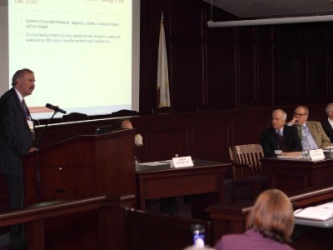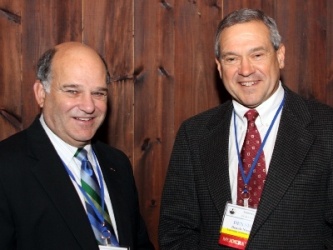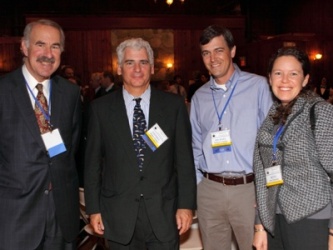Taking Stock: The Magnuson-Stevens Act Revisited
8th MARINE LAW SYMPOSIUM
November 4-5, 2010
Roger Williams University School of Law
Bristol, RI
Since passage in 1976, the Magnuson-Stevens Act has been the basis of one of the most compelling natural resource management issues of our time: the sustainable management of our nation's fisheries. The law has been amended several times and the subject of contentious debate and litigation in response to rapidly evolving information and policy objectives. The Symposium examined the current and future state of this body of law as a resource management scheme, including the complex integration of scientific, economic, and social information.
The Rhode Island MCLE Commission approved 11 CLE hours (no ethics credits) for the Symposium.

Susan Farady, RWU School of Law Marine Affairs Institute,
and Peter Shelley, Conservation Law
Foundation

Senator Sheldon Whitehouse (D-RI)

Sarah Parker ’11 and Lois Schiffer, General Counsel - NOAA


Dennis Esposito, RWU School of Law, and Dennis Nixon,
University of Rhode Island

Daniel Cohen, Fishermen’s Energy, Gene Martin, Office of NOAA
General Counsel Northeast, and
Andrew Minkiewicz, Kelley Drye & Warren, LLP

Eldon Greenberg, Garvey Schubert Barer, Vito Giacalone, Northeast Seafood
Coalition, Michael Conathan, U.S. Senate Committee on Commerce, Science and
Transportation’s Subcommittee on Oceans, Atmosphere, Fisheries and
Coast Guard, and Betsy Nicholson, NOAA Coastal Services Center

Donna Christie, Florida State University College of Law, Chris Littlefield,
The Nature Conservancy, Josh Eagle, University of South Carolina
School of Law, and Alison Rieser, University of Hawaii at Manoa
The Symposium proceedings are available for viewing at the links provided below. Windows Media Player is required to view the proceedings.
Thursday, November 4
Opening Recording
Friday, November 5
Keynote - Eric C. Schwaab, Assistant Administrator for Fisheries, NOAA, Recording
For more information, please contact the Marine Affairs Institute at marineaffairs@rwu.edu or 401-254-5392.
